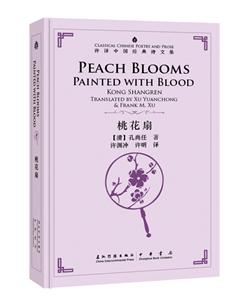-
>
我与父辈(九品)
-
>
商市街 回忆鲁迅先生
-
>
(精)川端康成经典辑丛:彩虹几度
-
>
(精)川端康成经典辑丛:古都·虹
-
>
(精)川端康成经典辑丛:舞姬·再婚者
-
>
碧轩吟稿
-
>
现代文学名著原版珍藏(第三辑)(全十五册)
桃花扇 版权信息
- ISBN:9787508540283
- 条形码:9787508540283 ; 978-7-5085-4028-3
- 装帧:一般轻型纸
- 册数:暂无
- 重量:暂无
- 所属分类:>
桃花扇 本书特色
丛书译者为许渊冲先生,其从事翻译工作70年,2010年12月荣获“中国翻译文化终身成就奖”;2014年8月荣获由国际译联颁发的文学翻译领域*奖项——“北极光”杰出文学翻译奖,成为首位获该奖的亚洲翻译家。经许先生的妙手,许多中国经典诗文被译成出色的英文韵语。这套汉英对照版“许译中国经典诗文集”荟萃许先生*代表性的英文译作14种,汉语部分采用中华书局版本。这些作品包括多种体裁,上起先秦,下至清代,既是联接所有中国人思想、情感的文化纽带,也是中国文化走向世界的重要桥梁。阅读和了解这些作品,即可尽览中国文化的“源头活水”。相信这套许氏译本能使英语读者分享孔子、老子的智慧,分享唐诗、宋词、中国古典戏曲的优美,并以此促进东西方文化的交流。2015年2月2日,由中国出版协会举办的第五届中华优秀出版物奖在京揭晓, “许译中国经典诗文集”(汉英对照)(14册)荣获“提名奖”。
桃花扇 内容简介
丛书译者为许渊冲先生,其从事翻译工作70年,2010年12月荣获“中国翻译文化终身成就奖”;2014年8月荣获由国际译联颁发的文学翻译领域奖项——“北极光”杰出文学翻译奖,成为首位获该奖的亚洲翻译家。 经许先生的妙手,许多中国经典诗文被译成出色的英文韵语。这套汉英对照版“许译中国经典诗文集”荟萃许先生具代表性的英文译作14种,汉语部分采用中华书局版本。这些作品包括多种体裁,上起先秦,下至清代,既是联接所有中国人思想、情感的文化纽带,也是中国文化走向世界的重要桥梁。阅读和了解这些作品,即可尽览中国文化的“源头活水”。相信这套许氏译本能使英语读者分享孔子、老子的智慧,分享唐诗、宋词、中国古典戏曲的优美,并以此促进东西方文化的交流。 2015年2月2日,由中国出版协会举办的第五届中华优秀出版物奖在京揭晓, “许译中国经典诗文集”(汉英对照)(14册)荣获“提名奖”。 许渊冲--诗译英法一人 ,北京大学教授,翻译家。希望这套许氏译本能使英语读者对中国经典诗文也能“知之,好之,乐之”,能够分享孔子、老子的智慧,分享唐诗、宋词、中国古典戏曲的优美,并以此促进东西文化的交流。值得珍藏。许渊冲先生从事翻译工作70年,2010年12月荣获“中国翻译文化终身成就奖”。他被称为将中国诗词译成英法韵文的专家,经他的妙手,许多中国经典诗文被译成出色的英文和法文韵语。这套“中国经典诗文集”就是由他所译,前半部分是英文,后半部分是中文。 Ancient Chinese classic poems are exquisite works of art. As far as 2,000 years ago, Chinese poets composed the beautiful work Book of Poetry and Elegies of the South, Later, they created more splendid Tang poetry and Song lyrics. Such classic works as Thus Spoke the Master and Laws: Divine and Human were extremely significant in building and shaping the culture of the Chinese nation. These works are both a cultural bond linking the thoughts and affections of Chinese people and an important bridge for Chinese culture and the world. Mr. Xu Yuanchong has been engaged in translation for 70 years. In December 2010, he won the Lifetime Achievement Award in Translation conferred by the Translators Association of China (TAC). He is honored as the only expert who translates Chinese poems into both English and French. After his excellent interpretation, many Chinese classic poems have been further refined into perfect English and French rhymes. This collection of Classical Chinese Poetry and Prose gathers his most representative English translations. It includes the classic works Thus Spoke the Master, Laws: Divine and Human and dramas such as Romance of the Western Bower, Dream in Peony Pavilion, Love in Long-life Hall and Peach Blossom Painted with Blood. The largest part of the collection includes the translation of selected poems from different dynasties. The selection includes various types of poems, lyrics and Yuan, Ming and Qing dynasty songs. The selected works start from the pre-Qin era to the Qing Dynasty, covering almost the entire history of classic poems in China. Reading these works is like tasting "living water from the source" of Chinese culture. We hope this collection will help English readers "know, love and appreciate" Chinese classic poems, share the intelligence of Confucius and Lao Tzu, share the gracefulness of Tang Dynasty poems, Song lyrics and classic operas and songs and promote exchanges between Eastern and Western culture. This book is one of the 14 books of Classical Chinese Poetry and Prose, a translation of Confucian classics Thus Spoke the Master.
桃花扇 目录
目 录
Preface1
序
ACT I
**本
Beauty and Duty
一见钟情结良缘
Scene 1 Visit to a Beauty
**出 访翠
Scene 2 Wedding Night
第二出 眠香
Scene 3 Dowry Rejected
第三出 却奁
ACT II
第二本
Word and Sword
一封书信阻刀兵
Scene 1 The Army
**出 抚兵
Scene 2 The Message
第二出 修札
Scene 3 The Camp Gate
第三出 投辕
ACT III
第三本
Crime and Succession
三罪阻立继位人
Scene 1 Parting
**出 辞院
Scene 2 The Emperor’s Death
第二出 哭主
Scene 3 Succession to the Throne
第三出 阻奸
ACT IV
第四本
Persecution on Persecution
三番两次逼香君
Scene 1 Refusa
**出 拒媒
Scene 2 Fragrant in Her Bower
第二出 守楼
Scene 3 The Fan
第三出 寄扇
ACT V
第五本
Songs and Tears
歌舞声中花泣血
Scene 1 The Banquet
**出 骂筵
Scene 2 Selection of Songstresses
第二出 选优
Scene 3 Lee’s Bower Revisited
第三出 题画
Scene 4 Epilogue
第四出 余韵
桃花扇 节选
Scene 3 The Camp Gate (Enter two soldiers.) First Soldier (Singing): Killing the foe, we take the things they leave; We occupy their houses but none grieve. Officers eat from the stores a great deal; Soldiers have from dawn till dusk their meal. Second Soldier: Now we do not sing like that. First Soldier: How do you sing now? Second Soldier (Singing): We can take nothing the foe leave; People’s empty houses make us grieve. Officers eat nothing from the store; Soldiers can have their meals no more. First Soldier: If what you sing is true, we poor soldiers would die of hunger. Second Soldier: That is almost true. First Soldier: Last time when we shouted for food supply, our general promised to station us around the food stores in the vicinity of the Southern Capital. But now days have passed without further information. Could our general have changed his mind? Second Soldier: If he changes his mind, we may raise another tumult. First Soldier: Do not talk about tumult. We had better go to the camp gate for the daily manoeuvre. Do not forget the punishment for violation of martial law is more terrible than hunger or even death. (Exeunt.) (Enter Liu Jingting with his baggage on the back.) 第三出 投 辕[1] (净、副净扮二卒上)(净)杀贼拾贼囊,救民占民房,当官领官仓,一兵吃三粮。(副净)如今不是这样唱了。(净)你唱来!(副净)贼凶少弃囊,民逃剩空房,官穷不开仓,千兵无一粮。(净)这等说,我们这穷兵当真要饿死了。(副净)也差不多哩。(净)前日鼓噪之时,元帅着忙,许俺们就粮南京,这几日不见动静,想又变卦了。(副净)他变了卦,俺们依旧鼓噪,有何难哉。(净)闲话少说,且到辕门点卯,再作商量。正是 “不怕饿杀,谁肯犯法”。(俱下) 【北新水令】(丑扮柳敬亭,背包裹上)走出了空林落叶响萧萧,一丛丛芦花红蓼。倒戴着接帽[2],横跨着湛卢刀[3],白髯儿飘飘,谁认的诙谐玩世东方老[4]。 俺柳敬亭冲风冒雨,沿江行来,并不见乱兵抢粮,想是讹传了。且喜已到武昌城外,不免在这草地下打开包裹,换了靴帽,好去投书。(坐地换靴帽介) 【南步步娇】(副净、净上)晓雨城边饥乌叫,来往荒烟道,军营半里遥。(指介)风卷旌旗,鼓角缥缈,前面是辕门了,大家趱行几步。饿腹好难熬,还点三八卯[5]。 (丑起拱介)两位将爷,借问一声,那是将军辕门?(净向副净私语介)这个老儿是江北语音,不是逃兵,就是流贼。(副净)何不收拾起来,诈他几文,且买饭吃。(净)妙!(副净问介)你寻将军衙门么?(丑)正是。(净)待我送你去。(丢绳套住丑介)(丑)呵呀!怎么拿起我来了?(副净)俺们是武昌营专管巡逻的弓兵,不拿你,拿谁呀。(丑推二净倒地,指笑介)两个没眼色的花子,怪不得饿的东倒西歪的。(净)你怎晓得我们挨饿。(丑)不为你们挨饿,我为何到此?(副净)这等说来,你敢是解粮来的么?(丑)不是解粮的,是做甚的。(净)啐!我们瞎眼了,快搬行李,送老哥辕门去。(副净、净同丑行介) 【北折桂令】(丑)你看城枕着江水滔滔,鹦鹉洲阔,黄鹤楼高[6]。鸡犬寂寥,人烟惨淡,市井萧条。都只把豺狼喂饱,好江城画破图抛。满耳呼号,鼙鼓声雄,铁马嘶骄。
桃花扇 作者简介
许渊冲(1921—),江西南昌人,北京大学教授,翻译家。早年在西南联大师从钱锺书先生,1941年入美国志愿空军任英文翻译,1948年留学法国巴黎大学,1950年底归国。此后从事教学和文学翻译达六十余年,译作涵盖中、英、法等语种,尤其在我国古诗英译方面,形成以韵体译诗的独特风格,有“诗译英法”之誉。钱锺书先生看到他的《李白诗选》英译本后评价说:“太白能通夷语……与君苟并世,必莫逆于心耳。”英国智慧女神出版社认为,他的《西厢记》英译本“在艺术性和吸引力方面,可以和莎士比亚的《罗密欧与朱丽叶》相媲美。”足见其英文造诣及翻译技巧在国人中实独步当世。 有中、英、法译著《诗经》《老子》《论语》《楚辞》《李白诗选》《西厢记》《红与黑》《包法利夫人》《追忆似水年华》等世界名著六十余种。2001年曾获诺贝尔文学奖提名;2014年荣获国际翻译界奖项“北极光”奖,系首位获此殊荣的亚洲翻译家。
- >
朝闻道
朝闻道
¥9.0¥23.8 - >
山海经
山海经
¥20.4¥68.0 - >
中国人在乌苏里边疆区:历史与人类学概述
中国人在乌苏里边疆区:历史与人类学概述
¥24.0¥48.0 - >
伊索寓言-世界文学名著典藏-全译本
伊索寓言-世界文学名著典藏-全译本
¥6.1¥19.0 - >
姑妈的宝刀
姑妈的宝刀
¥11.4¥30.0 - >
月亮与六便士
月亮与六便士
¥13.4¥42.0 - >
莉莉和章鱼
莉莉和章鱼
¥16.0¥42.0 - >
【精装绘本】画给孩子的中国神话
【精装绘本】画给孩子的中国神话
¥17.6¥55.0
-
鲜衣怒马少年时/意林
¥11.5¥36 -
行到水穷处,坐看云起时:王维诗传
¥11.4¥38 -
飞花令里读诗词
¥10.5¥35 -
人间词话
¥17.1¥22.8 -
飞花令里读宋词
¥17.9¥35 -
古今常用词律
¥11.5¥36















